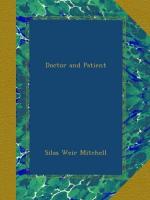At last he came back to Harvey. “He looks ill,” he said, which is true. His honestly-painted knuckles make diagnosis easy. My friend thought that this great man would probably have dosed him well, and, as he added, would not have bothered him about too much sugar, nor forbidden champagne. I had to reply that whatever ills were in the England of that day,—and there was much dyspepsia and much gout,—sugar was the luxury of the rich, and anything but as abundant as it is to-day, when we consume annually fifty-six pounds per head or per stomach. I told him that in all ages the best of us would have dwelt most on diet and habits of living, and that Harvey was little likely to have been less wise than his peers, and he has had but few. Then he said it would be curious to put on paper a case, and to add just what a doctor in each century would have ordered. The idea struck me as ingenious and fertile. I could wish that some one would do this thing. It would, I think, be found that the best men of every time were most apt to consider with care the general habits of their patients as to exercise and diet, and to rely less than others on mere use of drugs. As to this matter, one learns more from men’s lives than from their books, but nowadays care as to matters of hygiene has become in a valuable degree the common wisdom of a large part of my profession. Surveying our vast gains, we are a little apt to undervalue the men of older days, and no lesson is wiser than sometimes to go back and see how the best of them thought and acted amidst the embarrassments of imperfect knowledge.
There is a charming life by Henry Morley, of Cardan, the great Italian physician and algebraist, which gives us in accurate detail the daily routine of a doctor’s days in the sixteenth century. In it is an account of Cardan’s professional visit in 1551 to John Hamilton, archbishop of St. Andrew’s, Scotland, and practically the ruler of that turbulent realm. Cardan’s scientific opinion as to his patient is queer enough, but, as Morley remarks, it is probably not more amusing to us than will be our opinion in a like case to the smiling brother of our guild who may chance to read it at some remote future day. The physician of whom I now write was one who already dreaded bleeding, thought less of medicines than his fellows, and was, in fact, exceptionally acute. He did some droll things for the sick prelate, and had reasons yet more droll for what he did, but his practice was, as may happen on the whole, wiser than his reasons for its use. His patient was a man once bulky, but now thin, overworked, worried, subject to asthma, troubled with a bad stomach, prone to eat largely of coarse food, but indisposed to physical exercise. Cardan advised that the full, heated head, of which his patient much complained, should be washed night and morning with hot water in a warm room, and then subjected to a cold shower-bath. Next was to come a thorough dry rubbing, and rest for two hours. As to his




